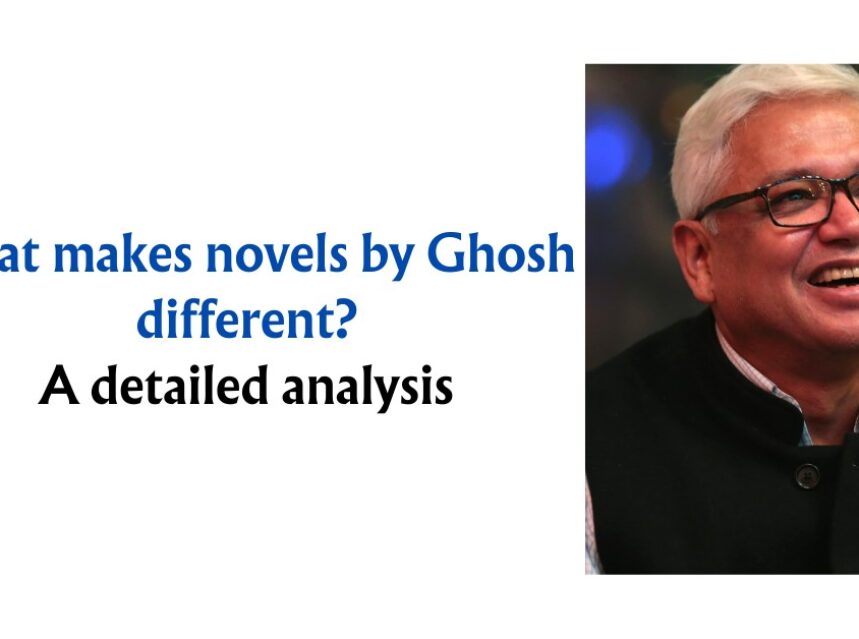
What makes Novels by Amitav Ghosh different and the ones you must read – details
Amitav Ghosh, certainly a luminary in contemporary literature, stands apart from his peers through a nuanced and multi-faceted approach that transcends traditional boundaries of storytelling. What distinguishes Ghosh’s novels is not merely the narrative intricacy or the richness of his prose but the expansive canvas upon which he paints narratives that seamlessly blend history, culture, and environmental consciousness. Unsurprisingly, in an era dominated by a myriad of voices, Ghosh’s work rises as a compelling testament to the interconnectedness of human destinies and the environment because of many qualities – apparent and implicit. His novels, including the acclaimed “The Ibis Trilogy” and “The Glass Palace,” navigate seamlessly between genres, intertwining historical events with deeply human stories. Ghosh’s unique narrative voice extends beyond the individual, capturing the collective experiences of communities, often marginalised or forgotten by mainstream historical narratives. His ability to seamlessly weave together meticulous research with evocative storytelling creates a literary tapestry that not only entertains but also educates and provokes thought. Ghosh’s novels, characterised by a global outlook, tackle pressing issues like climate change, migration, and colonial legacies, urging readers to contemplate the intricate threads connecting past, present, and future. As a writer who transcends the limitations of genres and geographical boundaries, Amitav Ghosh has carved a niche where literature becomes a bridge connecting diverse cultures, histories, and ecological concerns, making his body of work not just a collection of novels but a profound exploration of the human condition in its myriad dimensions.
Here are some must-read novels by Ghosh that you should not miss:
1. The Shadow Lines (1988): Ghosh’s exploration of borders, both geographical and personal, unfolds through the narrative of a nameless narrator. The novel delves into the impact of political events on individual lives, spanning Calcutta, Dhaka, and London.
2. The Glass Palace (2000): Set against the backdrop of colonial Burma, this epic novel weaves together the destinies of its characters against the sweep of historical events, from the fall of the Burmese monarchy to the Second World War.
3. The Calcutta Chromosome (1995): Merging science fiction with historical intrigue, this novel revolves around the quest to uncover the mystery behind the disappearance of L. Murugan, a medical researcher. The narrative spans continents and centuries, blending fact and fiction.
4. The Ibis Trilogy (2008-2015): Comprising “Sea of Poppies,” “River of Smoke,” and “Flood of Fire,” this monumental trilogy is set against the backdrop of the Opium Wars. It intricately explores the lives of a diverse cast of characters, from sailors to traders, against the tumultuous historical events of the 19th century.
5. The Hungry Tide (2004): Against the backdrop of the Sundarbans, this novel intertwines the lives of an Indian-American cetologist, an Indian interpreter, and a fisherman. It explores the delicate balance between nature and human intervention.
6. In an Antique Land (1992): Blurring the lines between fiction and non-fiction, Ghosh’s travelogue interweaves historical research with personal anecdotes. The narrative traverses twelfth-century Egypt and the author’s experiences in contemporary rural Egypt.
These novels showcase Ghosh’s unparalleled ability to blend history, culture, and environmental concerns into captivating narratives that transcend traditional literary boundaries. Each work invites readers into a world where the personal and the political converge, creating a tapestry of stories that resonate long after the last page is turned. Other than these novels, The Great Derangement, a work of non-fiction, explores the cultural and psychological dimensions of climate change, urging readers to confront the unprecedented challenges facing our planet.
By taking these details into account, one can see that Amitav Ghosh has indeed elevated Indian themes, global issues, and the essence of Kolkata storytelling to unprecedented heights through his literary oeuvre. Ghosh’s ability to seamlessly blend intricate historical narratives with deeply human stories has set him apart as a storyteller of remarkable calibre. His exploration of Indian themes goes beyond geographical boundaries, encompassing the diasporic experiences and interconnected histories that define the Indian subcontinent.
Ghosh’s engagement with global issues is a hallmark of his work. From the Opium Wars in the Ibis Trilogy to the ecological challenges in “The Hungry Tide,” he weaves together local and global concerns, illustrating the interconnectedness of our world. His narratives are a powerful reminder that individual lives are entwined with broader historical, political, and environmental forces.
Kolkata, often referred to as the literary capital of India, becomes a character in Ghosh’s stories. The city’s vibrant streets, cultural richness, and historical significance serve as a backdrop to many of his works. Kolkata, in Ghosh’s hands, becomes not just a setting but a living entity, contributing to the narrative texture and emotional depth of his novels.
Ghosh’s storytelling is characterised by a unique blend of meticulous research and a keen understanding of human experiences. Whether delving into the complexities of historical events or navigating the intricacies of personal relationships, Ghosh crafts narratives that resonate on a universal level. His works transcend cultural boundaries, inviting readers from around the world to engage with the multifaceted tapestry of his storytelling.
In summary, Amitav Ghosh’s literary contributions are a testament to the power of storytelling to transcend borders, both geographical and thematic. Through his exploration of Indian themes, global issues, and the vivid tapestry of Kolkata, Ghosh has enriched the literary landscape and provided readers with both thought-provoking and emotionally resonant narratives.
Read more: Gun Island Book Review
The Hungry Tide – study guide
Amitav Ghosh – biography & critical appreciation
Written by Chirayu for The Book Blog
